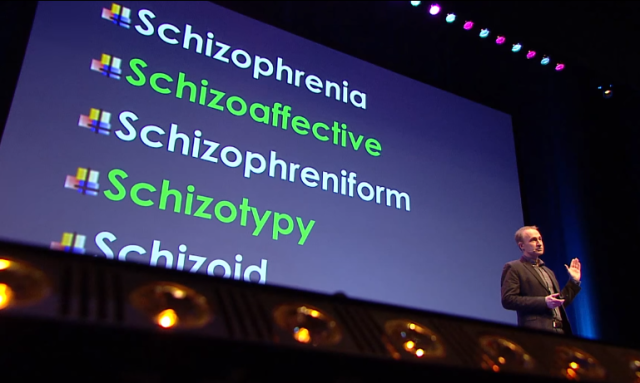 Jim Van Os and his big list of schitzo stereoptypes
Jim Van Os and his big list of schitzo stereoptypes
“Schizophrenia” does not exist.
That some people struggle and suffer and become isolated by that is not in doubt, especially here.
That they suffer because they have a “thing” and that “thing” is named “schizo-whatever” is just not true.
That people suffer because they have biological fault/ disease is a myth.
Scientifically, it doesn’t qualify as a diagnosis let alone a syndrome – there is simply too much variation in what gets given that name.
That people don’t recover is a lie, that they have no hope is only true because of the way other people treat them.
Schizophrenia is not a thing it’s an idea.
And it’s a really bad one.
What limits our freedom is the myths and stories that we tell ourselves and the myths and stories we tell each other.
The big list of “Schizo” is constructed from observations of people who had already been determined – by individuals given the power to determine it- as already lost and beyond any hope. Once confined to a life incarcerated, it’s no surprise that hope disappears, as does any sense of time and being and self. Cajoled, coerced and confined into a life of silence, people become non-people and the hopelessness institutionalized by the naming and the treatment becomes a self fulfilling prophesy, an oppression.
Since the first use of the term, clinicians observed that people whom they have so labelled do not recover. Maybe that’s because they only ever get to see the people made chronic by their “treatment”. Clinicians who only see sick people think everyone is sick and that they stay sick – because that’s what they see for themselves. People who do find their way to wellness and go on living their life invariably don’t go back to see their doc- they stay as far away as possible.
And, of course when we share a story of someone who has recovered – these same clinicians spout their usual retort “well of course they were probably incorrectly diagnosed [by some other clinician, of course] in the first place”.
Coming from the profession that appoints itself in charge of judging that people “lack insight”, that’s pretty rich.
“Schizophrenia” was constructed as a hypothesis – an honest attempt by clinicians to describe and categorise what they were observing. Thing is they were only observing what they could observe within the walls of institutions designed to incarcerate people who they’d already deemed were without hope, unable to ever get well. Well you would, wouldn’t you?
In other branches of science we have know for over a hundred years about “relativity” – what we observe is relative to the position we view it from. Viewed from a different place – or a different set of assumptions- whatever we observe looks quite different.
Doc, you need to get out more.
Psychiatric diagnosis – more properly called “classification” [as it is in the ICD ] is a closed system, perfectly designed to confirm the assumptions of the person making the assumptions – circular logic given the pretence of “science-yness” – immune and insulated from external influence.
That people suffer is undoubted, that they suffer because they have a thing called “schizophrenia” is pure codswallop.
That some people find themselves struggling in life, unable to sleep, confused, have difficulty making and keeping relationships, managing the sense of overwhelm, overpowered by emotions, difficult memories and flashbacks, the crushing exhaustion that comes with all that, dealing with a lifetime of abuse, oppression – lost, stuck, discarded, labelled, called names, and told “you’d be better off with cancer”…
That is all very real.
If you were treated like that how would you feel?
We can call a person’s struggle by many names, but calling it by a name built on assumptions that it is because they have a thing that doesn’t exist but that having it means they will spend the rest of their days in virtual prison and treated as less than human, that’s just bollocks.
“Schizophrenia” is a story – of the worst kind
What limits our freedom is the stories we tell ourselves and the stories we tell each other…
Schizophrenia is a story of the worst kind – a stereotype.
Constructed as a sellable story – a plausibly sciencey sounding story that a person struggles because they have a debilitating, irreversible brain disease, faulty genes or wobbly brain chemicals; with no hope of recovery; the person and their family henceforth condemned and completely depended on others telling them what’s wrong and what they must do, must not do, must believe and must not believe, and for the rest of their lives…
That’s bollocks – was there ever anything that was more bollocks?
Certainly on a list of “most bollocks things ever”, its pretty near the top.
“Schizophrenia” is nothing more than a stereotype.
Called a “diagnosis” yet fails to meet the standard of what constitutes a valid medical diagnosis. It even falls some way short of qualifying as a syndrome. As so often happens with psychiatry, diagnosis is often confused with classification.
So what is it?
Well, it’s a stereotype – and like most stereotypes, a harmful one.
If it were you or me who’d come up with it we’d likely be forced to take drugs or be electrocuted til comfortably numb-enough and sufficiently brain-zapped that we could let it go.
Here’s how a couple of Professors of Psychiatry – characterize it:
“A number of symptoms that have been collected together and given a name. “
“That is how our classification system works. We don’t know enough to diagnose real diseases, so we use a system of symptom based classification.”
– Dr Jim van Os; Prof. Psychiatry Maastricht U
“Because we don’t have the pathology we can’t say what’s going on in the brain, the mind,or whatever, we try and find the symptoms and cluster the symptoms together and we say we’ve got ‘this diagnosis’ or ‘that diagnosis’ and schizophrenia is a number of symptoms that have been put together to say that ‘this is an illness’.”
“That’s an idea, that’s not a thing”
– Dr Kwame McKenzie. Prof Psychiatry; U of Toronto
We use the “schizo” terms to convince ourselves and convince each other that we know what we are talking about and that we are talking about a uniform phenomenon. This is a pretence, a delusion.
Yet, what characterises this motley, unloved, unwanted and feared collection of symptoms, experiences and outcomes?
From Jim van Os again..
Extreme variability is the primary characteristic –
- Extreme variability of experience, symptoms.
- Extreme variability from person to person, day to day, even moment to moment within the same day.
- Extreme variability in prognosis. [likely outcome for a given treatment]
- Extreme variability in response to treatment.
That’s pretty random – in a list of things with the most extreme variability that’d be pretty near the top.
Strange, then, how services run by people claiming to be experts in things “mental health” respond by pretending that it is a thing; a sciencey thing no less; and a sciencey thing that they are learned experts in and about which they, and only they, know everything there is to know.
And they say we’re deluded….
Related posts
- Connecting to madness – Jim van Os https://recoverynet.ca/2015/11/02/connecting-to-madness-jim-van-os/
- “Schizophrenia”- an idea, not a thing https://recoverynet.ca/2015/09/08/schizophrenia-an-idea-not-a-thing/
Related stuff
- Schizophrenia does not exist https://www.schizofreniebestaatniet.nl/english/
- Schizophrenia does not exist – BMJ
Sadly the full article is behind paywall but you can get free 14day trial.
From BMJ 02.Feb.2016http://www.mj.com/content/352/bmj.i375.long
“Schizophrenia” does not exist
Disease classifications should drop this unhelpful description of symptoms.
BMJ 2016; 352 doi: http://dx.doi.org/10.1136/bmj.i375 (Published 02 February 2016)Cite this as: BMJ 2016;352:i375
Jim van Os, full professor and chair, Department of Psychiatry and Psychology, Maastricht University Medical Centre, PO Box 616, 6200 MD Maastricht, Netherlands
In March 2015 a group of academics, patients, and relatives published an opinion piece in a national newspaper in the Netherlands, proposing that we drop the “essentially contested”1 term “schizophrenia,” with its connotation of hopeless chronic brain disease, and replace it with something like “psychosis spectrum syndrome.”2
We launched two websites (www.schizofreniebestaatniet.nl/english/ and http://www.psychosenet.nl) aimed at informing the public about the nature of psychotic illness and helping patients deal with pervasive, unscientifically pessimistic, organic views of their symptoms. The timing was no coincidence.
Several recent papers by different authors have called for modernised psychiatric nomenclature, particularly regarding the term “schizophrenia.”3 4 5 6 Japan and South Korea have already abandoned this term.
Current classifications
The classification of mental disorders, as laid down in ICD-10 (International Classification of Diseases, 10th revision) and DSM-5 (Diagnostic and Statistical Manual of Mental Disorders …
___________________________________________________________
Longer piece from
medical express.com
Schizophrenia’ does not exist, argues expert
February 2, 2016
Functional magnetic resonance imaging (fMRI) and other brain imaging technologies allow for the study of differences in brain activity in people diagnosed with schizophrenia. The image shows two levels of the brain, with areas that were …more
The term “schizophrenia,” with its connotation of hopeless chronic brain disease, should be dropped and replaced with something like “psychosis spectrum syndrome,” argues a professor of psychiatry in The BMJ today.
Professor Jim van Os at Maastricht University Medical Centre says several others have called for updated psychiatric classifications, particularly regarding the term “schizophrenia.” Japan and South Korea have already abandoned this term.
The official list of mental disorders that doctors use to diagnose patients is found in ICD-10 (International Classification of Diseases, 10th revision) and DSM-5 (Diagnostic and Statistical Manual of Mental Disorders, fifth edition).
But Professor van Os argues that the classification is complicated, particularly for psychotic illness.
Currently, psychotic illness is classified among many categories, including schizophrenia, schizoaffective disorder, delusional disorder, depression or bipolar disorder with psychotic features, and others, he explains.
But categories such as these “do not represent diagnoses of discrete diseases, because these remain unknown; rather, they describe how symptoms can cluster, to allow grouping of patients.”
This allows clinicians to say, for example, “You have symptoms of psychosis and mania, and we classify that as schizoaffective disorder.” If your psychotic symptoms disappear we may reclassify it as bipolar disorder. If, on the other hand, your mania symptoms disappear and your psychosis becomes chronic, we may re-diagnose it as schizophrenia.
“That is how our classification system works. We don’t know enough to diagnose real diseases, so we use a system of symptom based classification.”
If everybody agreed to use the terminology in ICD-10 and DSM-5 in this fashion, there would be no problem, he says. However, this is not what is generally communicated, particularly regarding the most important category of psychotic illness: schizophrenia.
For example, the American Psychiatric Association, which publishes the DSM, on its website describes schizophrenia as “a chronic brain disorder,” and academic journals describe it as a “debilitating neurological disorder,” a “devastating, highly heritable brain disorder,” or a “brain disorder with predominantly genetic risk factors.”
This language is highly suggestive of a distinct, genetic brain disease, writes van Os. Yet strangely, no such language is used for other categories of psychotic illness, even though they constitute 70% of psychotic illness.
Scientific evidence indicates that the different psychotic categories can be viewed as part of the same spectrum syndrome, he adds. However, people with this psychosis spectrum syndrome display extreme diversity (heterogeneity), both between and within people, in psychopathology, treatment response, and outcome.
He believes that the best way to inform the public and provide patients with diagnoses, is to forget about “devastating” schizophrenia as the only category that matters “and start doing justice to the broad and heterogeneous psychosis spectrum syndrome that really exists.”
And he argues that ICD-11 should remove the term “schizophrenia.”
More information: “Schizophrenia” does not exist,The BMJ,www.bmj.com/cgi/doi/10.1136/bmj.i375





















































































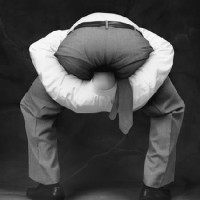

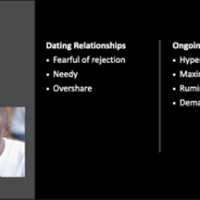
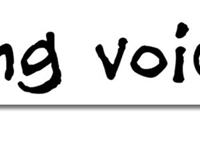





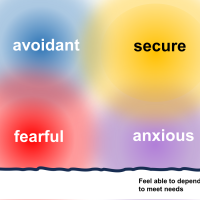




I couldn’t agree with you more. Ever since I’ve read Mary Boyle’s excellent book “Schizophrenia, A Scientific Delusion?” I know I won’t be fooled by that diagnosis ever again. It’s great to see that more and more people are questioning what’s going on and writing about it.
LikeLike
THe title of that book sounds like an oxymoron.[?] I guess that’s the point.
Philip Thomas’ “Dialectics of Schizophrenia” left me considering that the field of human knowledge least able to understand difficult human experiences is our currently formed institutions of psychiatry – including all those other institutions that hide behind its skirts and drag along behind hanging on to its coat tails.
I really don’t get how that approach could possibly qualify as “soul-healing”.
LikeLike
Yep, that is her point. She went all the way back to Kraepelin and Bleuler and discovered that their descriptions of ‘dementia praecox’ and schizofrenia were as muddled and imprecise as the criteria we’ve got today. I’ve ordered “Dialectics of Schizophrenia” but I haven’t read it yet. Would you recommend it?
LikeLike
Hi kayakangst.
Guess it’d be hard not to draw that same conclusion.
The criteria we have today are pretty much the same, with added sciencey sounding bits that dont actually mean anything..
My voices have much clearer ideas.
Dialectics of Schz…
Having read the book, I was none teh wiser as to what either “dialectics” is – or “schizophrenia”but I felt comforted that nobody else has a clue either.
It’s well worth a read – looks at it from many perspectives. Best bit for me is when he tells the story of how he met Ron Coleman. I got to meet Phil Thomas a couple of years after reading it- top bloke.
If you’re looking for insightful books this one takes a different tack but is probably the book I learned most from…
Thanks for the Mary Boyle tip.
I try not to “recommend” anything , I could make an exception for this book…
“Primordial Mind in Health and Illness”
– Michael Robbins.
Kevin
LikeLike
Thanks for your reply, Kevin. It made me smile. I agree with your point: in a way, Mary Boyle is stating the obvious. But she does it in the language of scientific research, she doesn’t mince words and the way she dissects the so-called genetic proof from twin studies is quite interesting. I will definitely look into the book you mentioned. Thank you. Emma.
LikeLike
🙂
LikeLike
Jenny: He’s not saying that ‘the problems do not exist’. Rather he is saying that the ‘diagnosis’ or the ‘label’ is false, in that it cannot be directed to any personal individual experience. In some sense, even religion could be more helpful than some objectivity that is found in science. But even here, I make a false statement. Indeed therapies such as developing the Vedic traditions of mindfulness and ways of meditation (understood in the west as various forms of prayer) can indeed be helpful, and are not part of some ‘secular’ therapies. For me, these psychological/’spiritual difficulties have always been an incentive to learn, and so throughout my life I have been constantly involved with the study of philosophy and various world religions. It is within the context, always an incentive to understand not only others, but such things as my own motivations. Have just finished reading a synopsis of the differences between the Vedic traditions and the Abrahamic religions, for instance. And, yes, more and more I can see how lack of knowledge of another can be what is today called ‘cognitive bias’ towards that which one attempt to convey about another human/divine perspective. In this case, the balance was towards the Vedic alternative, as that was the source of the account. I mention this because hopefully, it can be seen to be parallel in a way to how ‘mental illness’ is understood by others, and as the point of this essay makes clear, even in the diagnosis of the scientific parameters of what is entailed by the ‘state of being’ they ‘call’ schizophrenia. In that sense, perhaps, nothing ‘exists’ in the way that it is merely defined, although both the formal diagnosis and more importantly the feelings, the lived experience of what it attempts to describe are indeed to be considered justifiably ‘real’ for those who experience them. Please know then, that according to the Buddha, what I have just said has no ‘reality’ whatsoever!!! but we live through these illusions, according to this tradition which can be found within western philosophies too, with the faith and hope that we will indeed live one day within the ‘real reality’ whether it be called Nirvana or Heaven!!!! It is almost best sometimes to think of one’s situation, not as having a ‘mental illness’, but as a condition that can be regarded as an incentive to seek the ‘higher truth’……All the best. (Truly hope this is helpful!!!!) There are quotes out there by Nietzsche and about not being able to find the only persons who could be sane, – the stoic sage – that seek to show that all who live within this life are to some degree lacking in ‘sanity’…. You are capable of defining your own ‘reality’!!!
LikeLike
“That some people find themselves struggling in life, unable to sleep, confused, find difficulty making and keeping relationships, managing the sense of overwhelm, dealing with a lifetime of abuse, oppression – lost, stuck, discarded, labelled called names, told “you’d be better off with cancer”.
That is all very real.
If you were treated like that how would you feel?”
It made me feel pretty crappy. And all that was going on before I got the diagnosis, only then I was expected to “pull myself together” and somehow function and survive in a world that didn’t seem to want me and I didn’t understand, dealing with homelessness, dealing with joblessness, dealing with predators and somehow it’s my fault for not getting with the program.
Honestly maybe it’s just me, but this smacks a little to much of the “just learn to deal with it” type stuff a lot of people with various mental illness get dismissed with as they’re left to drown by family and others…where I live at least a diagnosis on paper might at least make someone eligible for treatment and programs that will make things a little easier. What exactly does this guy have in mind for helping those people after he’s decreed our problems don’t exist?
LikeLike
Hi jenny devil doll . where did “this guy” decree that your problems don’t exist?
I didn’t. I wouldn’t.
And, as others have said, I made that pretty clear.
I think if you read it again you’ll realise that.
LikeLike
How you read it – how it smacks – might be different from what it says.
lWe dont tell people whats wrong with them we dont tell people what to do – we choose not to join tat chorus- because we know from experience how much it sucks.
We would, however, fight for more space to allow people to figure out and name their own experience in their own terms, have their own truth accepted, find more options, trust themselves to figure what works for them and to make their own choices.
We would never say “its your fault” -“just learn to deal”.
We do believe its possible to learn how to live with -and overcome/ transcend anything, any experience – because we are doing just that, and plenty of us have done / are doing so .
It’s never easy to do that – it might be the hardest thing we ever do – but also the best.
What limits our freedom is the stories we tell ourselves and each other.
Our current prime story sucks and limits us all.
Even if it works a few, the rest of us have the right to find what works for us without having one idea imposed on us.
It is but a story that we have given a great deal of power over us.
We can make a new one.
You’ve made your choice, good for you- so why would you even want to deny others the right and the space to make theirs?
That’s what we’re about.
If you want to see what we do as something else then that is also your choice to make.
LikeLike
Yeah??? But it takes longer to write about it!!!
LikeLike
Thanks for this Kevin.
LikeLike
Hi Loreen, you’re welcome.
boy , you read fast!
LikeLike